Daily Vocabulary Words: List of Daily Used Words in Leading Indian Newspapers
Hi there. Welcome to this special section @ Wordpandit. Our endeavour here is straightforward: highlighting daily vocabulary words that you would come across in leading newspapers in the country. We have included the following newspapers in our selection:
• The Times of India
• The Economic Times
• Hindustan Times
• Mint
• Indian Express
We are putting in extensive work to develop your vocabulary. All you have to do is be regular with this section and check out this post daily. This is your repository of commonly used words; essentially, we are posting a list of daily used words. Hence, this has significant practical application as it teaches you words that are commonly used in leading publications mentioned above.
Visit the website daily to learn words from leading Indian newspapers.
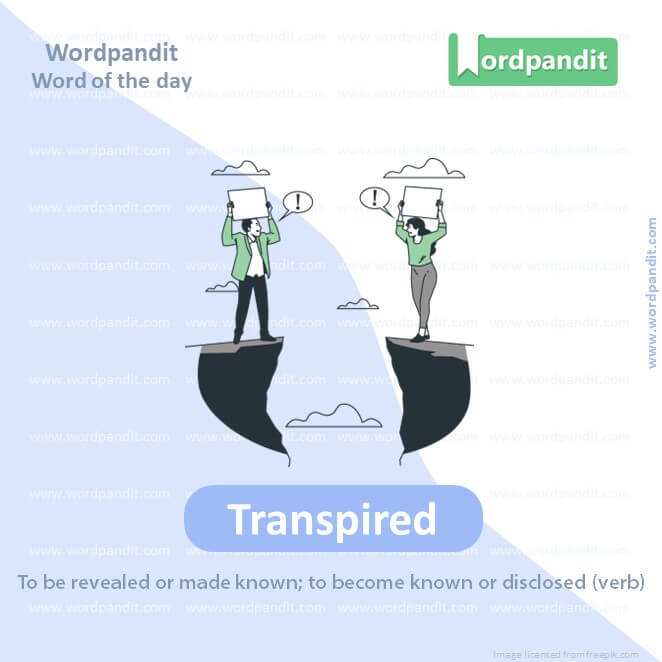
WORD-1: Transpired
CONTEXT: Only in a span of a few months, multiple meetings have transpired between the two leaders, and Modi’s visit to Paris last July saw the launch of an ambitious Horizon 2047 Roadmap.
SOURCE: Hindustan Times
EXPLANATORY PARAGRAPH: Imagine you have a secret diary, and one day, your friend finds it and reads all your stories. That’s a bit like what “transpired” means—it’s when something that happened or a secret that was supposed to be private is revealed or shared with others.
MEANING: To be revealed or made known; to become known or disclosed. (verb)
PRONUNCIATION: tran-spahyrd
SYNONYMS: occurred, happened, unfolded, revealed, emerged
USAGE EXAMPLES:
1. The truth about the surprise party transpired when the decorations were accidentally discovered.
2. It transpired that the missing toy was hidden under the bed all along.
3. The secret plans transpired when the spies accidentally left their notes behind.
4. The mystery behind the locked door transpired when the key was found.
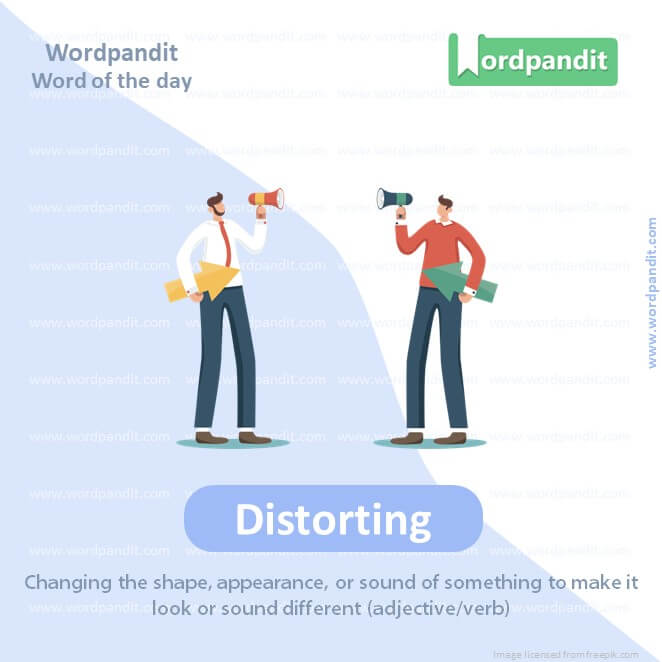
WORD-2: Distorting
CONTEXT: Subsidies usually end up distorting economic incentives and almost always do not benefit those they are aimed to help.
SOURCE: Hindustan Times
EXPLANATORY PARAGRAPH: Have you ever played with a funhouse mirror that makes your reflection look funny? That’s a bit like what “distorting” means—changing or twisting something so it doesn’t look or sound like it should. It’s like turning a regular banana into a banana that looks like a curly noodle!
MEANING: Changing the shape, appearance, or sound of something to make it look or sound different. (adjective/verb)
PRONUNCIATION: dih-stawr-ting
SYNONYMS: deforming, warping, altering, misrepresenting, twisting, contorting
USAGE EXAMPLES:
1. The funhouse mirror had a distorting effect on everyone’s faces, making them look silly.
2. The artist enjoyed distorting reality in their paintings to create a unique and imaginative world.
3. The loudspeaker was distorting the music, making it difficult to recognize the melody.
4. His memory was distorting the events, making the story much more exciting than it actually was.
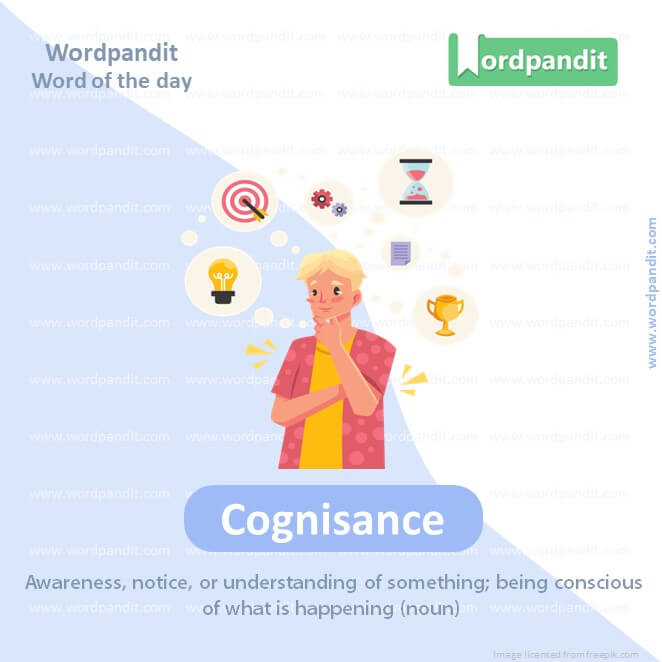
WORD-3: Cognisance
CONTEXT: The court’s order was timely. As far too often in such cases, courts only take cognisance after the demolitions and evictions have been conducted
SOURCE: Hindustan Times
EXPLANATORY PARAGRAPH: Cognisance is like when you notice or become aware of something. It’s when you pay attention and understand what’s happening around you, like noticing the colors of the flowers in a garden or hearing the sound of birds singing.
MEANING: Awareness, notice, or understanding of something; being conscious of what is happening. (noun)
PRONUNCIATION: kog-nuh-zuhns
SYNONYMS: awareness, consciousness, recognition, perception, realization
USAGE EXAMPLES:
1. The dog barked loudly, bringing cognisance to the arrival of a visitor.
2. The teacher praised the students for their cognisance of the important details in the story.
3. He nodded in cognisance of the instructions given, showing that he understood what was expected.
4. The detective took cognisance of the subtle clues, leading to the solution of the mystery.
WORD-4: Spillage
CONTEXT: the cost of one unit is ₹ 4 as compared to about the ₹ 6.5 average cost of power procured in India after factoring in transmission losses, carriage charges, and spillage in the networks.
SOURCE: Hindustan Times
EXPLANATORY PARAGRAPH: Imagine you accidentally knock over a glass of juice, and it spills all over the table—that’s a spillage! It’s when something liquid, like water or juice, accidentally falls out of its container and makes a mess.
MEANING: The accidental overflow or release of a liquid from its container, creating a mess. (noun)
PRONUNCIATION: spil-ij
SYNONYMS: leakage, overflow, spill, discharge, splatter
USAGE EXAMPLES:
1. The spillage of paint on the floor resulted in a colorful but unintended masterpiece.
2. The waiter quickly cleaned up the spillage of soup on the restaurant floor.
3. The spillage of water from the overturned bottle created a small puddle on the kitchen counter.
4. The careful handling of the fragile package prevented any spillage of the contents.
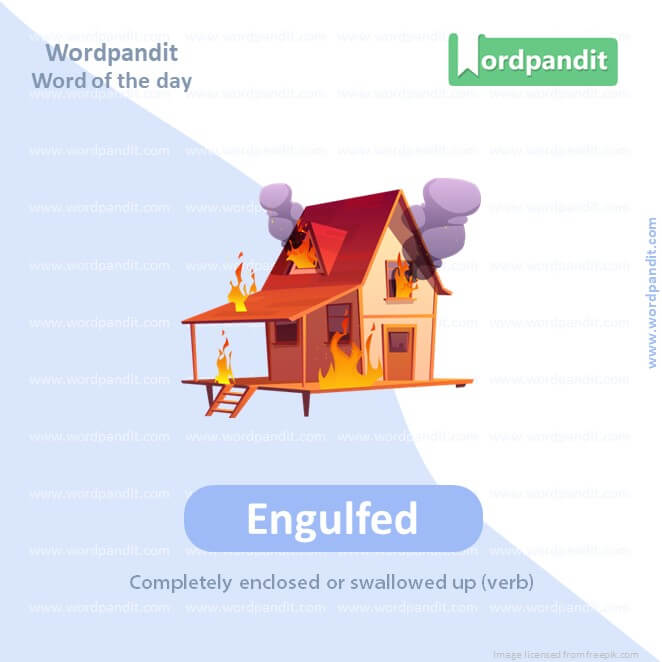
WORD-5: Engulfed
CONTEXT: the India-France partnership is a force for global good in a volatile world engulfed in multiple crises.
SOURCE: Hindustan Times
EXPLANATORY PARAGRAPH: Imagine a big wave at the beach coming towards you and covering you completely—that’s a bit like what “engulfed” means. It’s when something surrounds or covers another thing completely, like a big, warm hug but on a much larger scale.
MEANING: Completely enclosed or swallowed up (verb).
PRONUNCIATION: en-guhlfed
SYNONYMS: swallowed, immersed, enveloped, consumed, overwhelmed, covered
USAGE EXAMPLES:
1. The darkness of the night engulfed the forest, making it difficult to see anything.
2. The flames quickly engulfed the old wooden house, causing it to burn down.
3. As the fog rolled in, it gradually engulfed the entire city in a thick, misty blanket.
4. The warm water of the hot tub engulfed her, providing a relaxing and soothing experience.
WORD-6: Spanning
CONTEXT: A multi-faceted partnership spanning cooperation in a range of sectors, defence remains at its core.
SOURCE: Hindustan Times
EXPLANATORY PARAGRAPH: Imagine you have a really long ruler, and you use it to measure from one end of your room to the other—that’s a bit like what “spanning” means. It’s about the length or distance from one side to the other, like measuring how long a bridge is from one end to the other.
MEANING: Extending across a distance; the length or duration between two points. (verb/adjective)
PRONUNCIATION: span-ing
SYNONYMS: covering, stretching, extending, reaching, measuring, crossing
USAGE EXAMPLES:
1. The bridge spanning the river was an impressive sight, connecting two towns.
2. The project’s timeline is spanning over several months to ensure thorough completion.
3. The rainbow spanning the sky brought a colorful and cheerful display after the rain.
4. His career spanning three decades included various achievements and experiences.
WORD-7: Infructuous
CONTEXT: the case infructuous (this was what happened, to a large extent, in the notorious Jahangirpuri demolitions in 2023). By ensuring that relevant orders were passed while the petitioners’
SOURCE: Hindustan Times
EXPLANATORY PARAGRAPH: Infructuous is like planting a seed but not getting any fruits from it. It means doing something that doesn’t bring the results or benefits you were hoping for, like when you plant a flower seed, but the flower doesn’t grow.
MEANING: Unsuccessful or not resulting in the desired outcome; producing no fruit or result. (adjective)
PRONUNCIATION: in-frook-choo-us
SYNONYMS: fruitless, unproductive, unsuccessful, futile, vain, unrewarding
USAGE EXAMPLES:
1. Despite their efforts, the mission turned out to be infructuous, and no progress was made.
2. The attempt to repair the old computer proved to be infructuous as it continued to malfunction.
3. His search for the lost keys was infructuous, and he had to get a replacement set.
4. The negotiations between the two parties were infructuous, leading to no agreement.
WORD-8: Punitively
CONTEXT: the municipality to engage meaningfully with the residents, before punitively evicting them.
SOURCE: Hindustan Times
EXPLANATORY PARAGRAPH: Punitively is a bit like when you have to face a consequence for something you did wrong. It means that something is done to make sure you learn a lesson or face the results of your actions, like a gentle tap on the hand when you reach for cookies before dinner.
MEANING: In a way that involves or inflicts punishment; to teach a lesson or impose consequences. (adverb)
PRONUNCIATION: pyoo-ni-tiv-lee
SYNONYMS: penalizing, retributively, disciplinary, chastening, correctionally
USAGE EXAMPLES:
1. The child was punitively sent to timeout for misbehaving in class.
2. The company was fined punitively for violating environmental regulations.
3. The teacher punitively assigned extra homework to the students who didn’t complete their assignments.
4. The judge decided to rule punitively to deter others from similar illegal activities.
WORD-9: Stipulating
CONTEXT: the court also prevented precipitate and violent State action by stipulating that four weeks would have to be given to the inhabitants to apply for the resettlement scheme, and have their claims processed
SOURCE: Hindustan Times
EXPLANATORY PARAGRAPH: Stipulating is a bit like making a rule or setting up a special condition for something. It’s like saying, “You can play with my toys, but only if you promise to put them back where you found them.” Stipulating is about making clear what you expect or require.
MEANING: Specifying or setting conditions or rules; making something a requirement. (verb)
PRONUNCIATION: stip-yuh-leyt-ing
SYNONYMS: specifying, requiring, demanding, setting, dictating, establishing
USAGE EXAMPLES:
1. The contract stipulates that the work must be completed by a specific deadline.
2. Before borrowing the book, she stipulated that it should be returned in the same condition.
3. The school rules stipulate that students must wear uniforms during class hours.
4. The job offer comes with certain stipulating conditions that must be agreed upon.
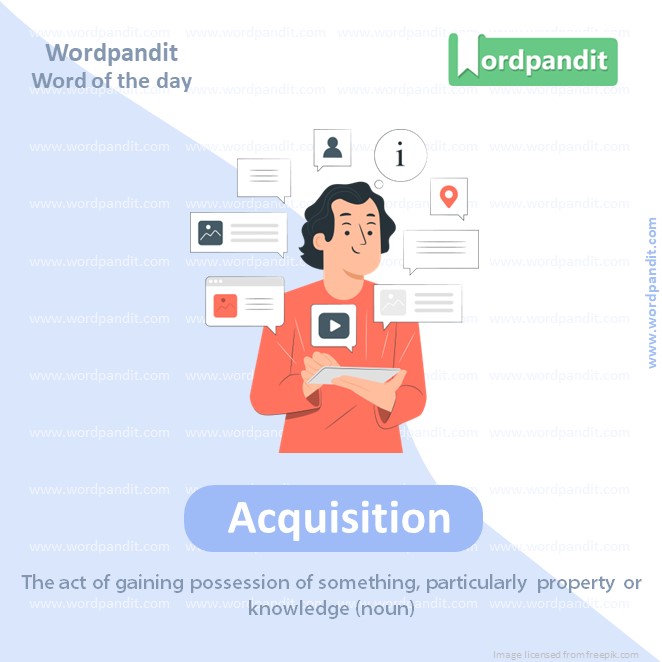
WORD-10: Acquisition
CONTEXT: Defence acquisition is a comparatively tedious process in the US compared to France’s more centralised system.
SOURCE: Hindustan Times
EXPLANATORY PARAGRAPH: Acquisition is like when you add a new toy to your collection or get a new book for your library. It means getting or obtaining something, like bringing home a new friend or finding a shiny pebble during a walk in the park.
MEANING: The act of gaining possession of something, particularly property or knowledge (noun).
PRONUNCIATION: ak-wuh-zish-uhn
SYNONYMS: obtaining, gaining, securing, procurement, attainment, possession
USAGE EXAMPLES:
1. The company celebrated the successful acquisition of a smaller business.
2. Her acquisition of new skills made her a valuable member of the team.
3. The museum’s latest acquisition is a rare and valuable piece of art.
4. The family’s acquisition of a new pet brought joy and excitement to the household.
Vocabulary English Grammar
Delving into the vast universe of language learning, the ‘Vocabulary English Grammar’ acts as a beacon, illuminating the path to mastery. This synergy of words and rules forms the quintessential framework of the English language. However, understanding ‘Vocabulary English Grammar’ in-depth requires a fine-tuned strategy.
First and foremost, understanding ‘Vocabulary English Grammar’ goes beyond only remembering rules and words. It involves learning how a word functions in a grammatical context. To achieve this, resources like textbooks, online grammar guides, and interactive language learning apps prove to be very valuable.
However, embracing ‘Vocabulary English Grammar’ calls for consistent practice. Adopting thematic learning, where you concentrate on a specific grammatical concept and the vocabulary related to it, can be particularly effective. Reading material like articles and books, or engaging with podcasts and films can provide a real-world context to these concepts.
The key to mastering ‘Vocabulary English Grammar’ lies in constructing sentences. Instead of memorizing disconnected words and rules, start framing sentences. This active application significantly bolsters comprehension and provides practical insight into how grammatical rules govern the use of words.
To truly excel in ‘Vocabulary English Grammar’, it’s important to seek feedback. Participate in language exchange platforms or conversation clubs. These platforms provide an opportunity to apply what you’ve learned and obtain constructive feedback on your progress.
In essence, understanding ‘Vocabulary English Grammar’ is a step-by-step process that requires thoughtful learning, constant practice, application, and proactive feedback. By embedding these techniques into your language learning routine, you can confidently navigate ‘Vocabulary English Grammar’. Remember, mastering ‘Vocabulary English Grammar’ is not about perfection, but about progression and communication. Each rule learned, each word comprehended, brings you closer to the fluency in your English language journey.













